Having something go wrong with your digestion is enough to completely derail whatever plans you had for the day. Whether it's having to sprint to the restroom way too much, or having the opposite issue of being constipated and unable to go to the bathroom, these discomforts are incredibly inconvenient. And while certain foods and drinks can help you pass bowel movements, there are also supplements you can have on hand to help you poop immediately and get back to your scheduled plans.
To understand relieving constipation, we need to first understand what keeps us from having regular bowel movements. For one, there are certainly serious issues and diseases that can disrupt your colon and bowel health, but everyday things such as stress, being dehydrated, hormone imbalance, pregnancy, not getting enough physical activity, and not eating enough fiber are all common factors that can make it harder to poop.
Psyllium husk
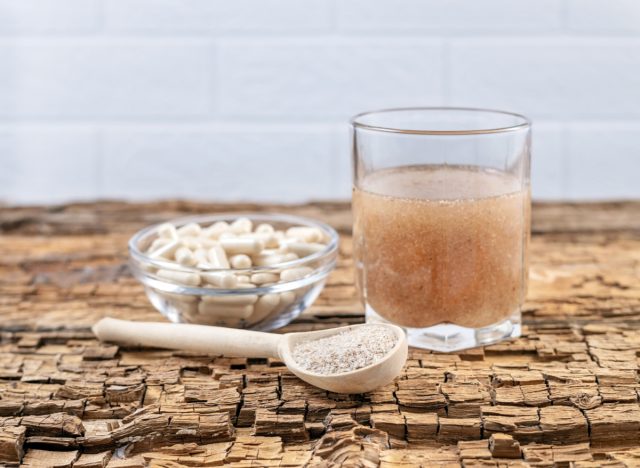
If you're feeling backed up and need a bit of relief, Mary Sabat MS, RDN, LD suggests trying psyllium husk. "Psyllium husk is a dietary fiber that is commonly used as a laxative to promote bowel movements," says Sabat. "It works by absorbing water in the gut, which helps to soften the stool and make it easier to pass. A study published in the Journal of the American Medical Association found that psyllium supplementation improved constipation symptoms in adults when compared to a placebo group." In fact, if you've ever used the popular laxative brand Metamucil, then you've already tried psyllium husk.
However, Sabat notes that "it is important to note that psyllium should be taken with plenty of water to avoid any potential adverse effects."
Magnesium
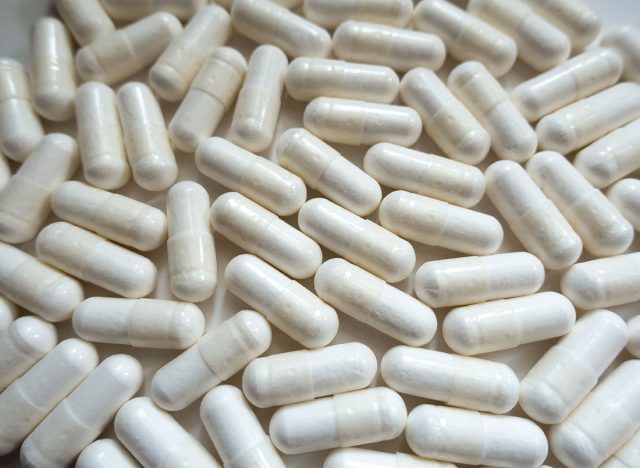
Another supplement that Sabat suggests when you need some constipation relief is magnesium citrate, which you can find at most drug stores.
"Magnesium citrate is a supplement that is often used to treat constipation, and it works by relaxing the muscles in the intestines, which can help to promote bowel movements," says Sabat. "And, a study published in the Journal of Clinical Gastroenterology found that magnesium citrate was effective in relieving constipation symptoms in patients with irritable bowel syndrome."
Probiotics
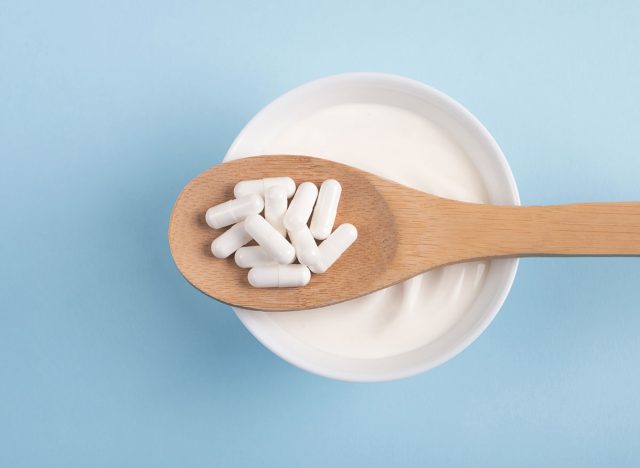
Not being able to go to pass a bowel movement may be caused by a multitude of things, but one way to help ensure that your digestion is healthy is by taking care of your gut. A simple way to do this? Have probiotics on hand.
"Probiotics are beneficial bacteria that are commonly found in the gut," says Sabat. "They can be taken as a supplement to help improve digestion and promote bowel movements. A study published in the World Journal of Gastroenterology found that probiotic supplementation improved bowel movements in patients with constipation-predominant irritable bowel syndrome."
Aloe vera
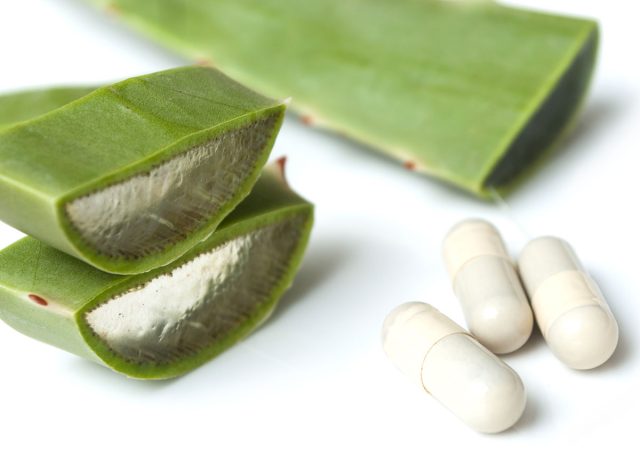
Most people may only know Aloe Vera as a moisturizer or sunburn relief, but what you may not realize is that you can buy it in pill form to help with digestion.
"Aloe vera has antioxidant properties that increase intestinal motility speed, which may improve constipation, and it is soothing on the gut and reduces gut inflammation and bloating," says Paulina Lee, MSHS, RD, LD, functional gut health dietitian and founder of Savvy Stummy. "It is traditionally used to treat digestive problems because of its anti-inflammatory, antimicrobial, and wound-healing properties, and an animal study showed improved intestinal motility, increased stool volume, and normalized body weight from aloe leaf extract intake."
Fiber supplements
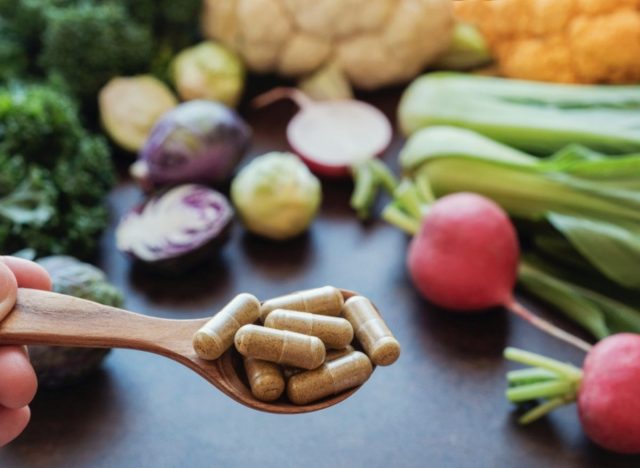
Dietary fiber helps soften your stool and helps you poop. And although getting fiber through the food you eat is the best way to do it, it can sometimes be difficult to get enough. If this is the case and you need a fiber boost, you can always supplement.
"Consuming a fiber supplement that offers a blend of insoluble and soluble fiber, and ideally some resistant starch too, will provide the trifecta of gut and digestive fuel to help both soften stools and help push the stool down the digestive tract so that it can pass with more ease," says Kara Landau, Founding RD at Gut Feeling Consultancy and nutrition advisor to the Global Prebiotic Association. "Resistant starch is a non-digestive carbohydrate that acts similar to a fiber, and also feeds the good gut bacteria, aiding in supporting a healthy gut at the same time."
Ground flaxseed
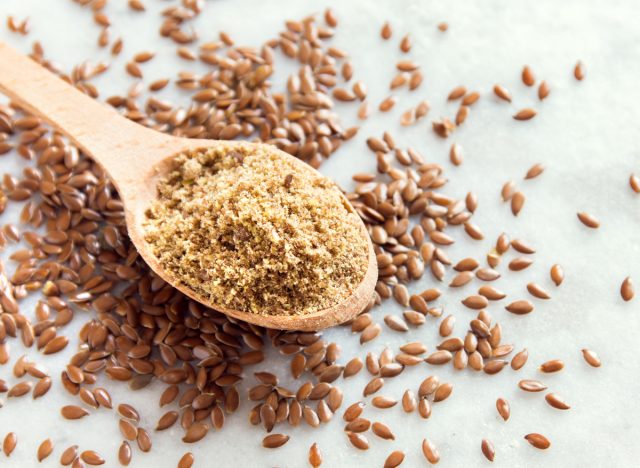
Another way to get extra fiber is to supplement with ground flaxseed. You can add this to milk, smoothies, coffee, yogurt, etc. Kelsey Costa, MS, RDN, registered dietitian nutritionist at MIDSS says, "Rich in dietary fiber, ground flaxseed can help bulk up stools and move food through the gastrointestinal tract more quickly, which can relieve constipation and help encourage regular bowel movements."
She adds that research backs this up too, saying that "A 2020 randomized control trial found that consuming ground flaxseed daily improved stool consistency and increased bowel movements."
Partially hydrolyzed guar gum
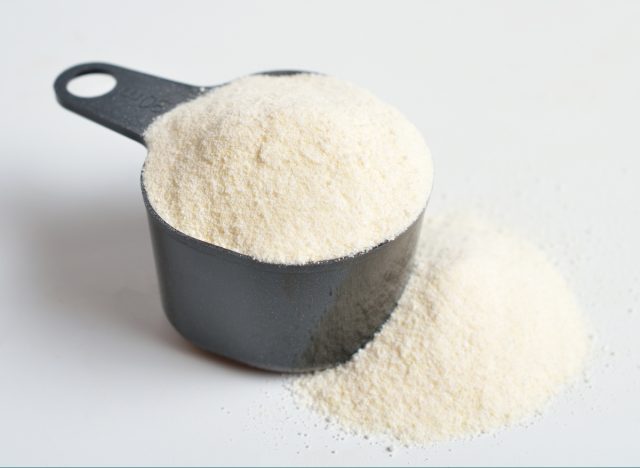
A lesser-known type of fiber is partially hydrolyzed guar gum, which you can take as a powdered supplement. "This dietary fiber is a prebiotic, which means it feeds your good gut microbes, and they in turn provide health benefits," says Kim Kulp, RDN, registered dietitian nutritionist and gut health expert. "It dissolves completely in water, making it easy to consume the 5-7 grams that can help with constipation."
No comments:
Post a Comment